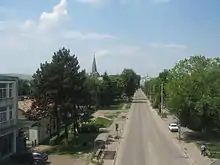Ițcani
Ițcani (German: Itzkany) is a neighborhood of Suceava, Romania, located some 5 km northwest of the city center. It was established in the 15th century, following a 1453 document issued by Alexăndrel, Prince of Moldavia. In the 1780s 8 ethnic German families settled here in the course of the Josephine colonization.[1] After the unification with the Kingdom of Romania, Ițcani was initially recorded on censuses as a commune composed of two villages, more specifically Ițcanii Noi (German: Neu Itzkany) and Ițcani Gară (German: Itzkany Bahnhof).

Furthermore, according to the Romanian 1930 census, as much as 45% of the commune's population was composed of ethnic Germans, many of whom were later re-settled in occupied Poland during World War II as part of the Heim ins Reich policy plan initiated by Hitler's national socialists. Suceava North railway station is located in Ițcani.
References
- Welsch, Sophie A. (1986). "The Bukovina-Germans During the Habsburg Period: Settlement, Ethnic Interaction, Contributions" (PDF). Immigrants & Minorities. Archived from the original (PDF) on 2015-09-05.
| Wikimedia Commons has media related to Ițcani (Suceava). |